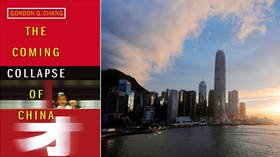Basket case Britain has chosen the wrong time to ramp up hostility on China and needs to stop living in the past
Post-Brexit, Britain should be looking to forge trade deals across the world. But instead of forming new bonds with China, it’s pursuing an aggressive anti-Beijing policy – which will likely cost it dear in the long run.
Just over a year ago, Boris Johnson publicized a phone call he had with Xi Jinping. “I love China” he was reported to have stated. At the time, China was struggling with the outbreak of the Covid-19 pandemic in Wuhan. Johnson pledged to strengthen economic ties with Beijing, providing another broad hint of the enthusiasm he held toward China as an option for post-Brexit trade and investment.
Now, this conversation and proposal seem like a distant memory. At the same time as Joe Biden’s administration has moderated the aggressive rhetoric that Donald Trump was hurling at Beijing on a daily basis, the United Kingdom has ramped up hostility toward China, through both official channels and the media.
First came the revoking of CGTN’s license to broadcast in the UK, then an announcement that three Chinese journalists had been expelled from Britain on the basis of being spies and on Monday the news that 200 academics are facing investigations over their links to China. The BBC is running regular reports on the Uighurs’ situation in Xinjiang, too.
None of this is a coincidence. Although it has been a long time coming, given the escalation of tensions over Hong Kong and pressure from Washington for the UK to harden its position, it seems clear that the British government has finally made a clear decision to get tough on Beijing. Indeed, Britain’s post-Brexit identity is taking on an increasingly anti-China character.
This is a bad choice, and the wrong choice. Boris Johnson’s original assessment that China would be an important economic partner marked a realist depiction of the UK’s place in the world and Beijing’s increasingly prominent role in the global economy.
But instead of reinventing itself, the UK government has seemingly decided it is a Pacific power again, and is attempting to lay down the law to China as if it is the 19th century, while at home its economy lies in ruins. And a change of course is unlikely, given a large portion of the Conservative Party and the Labour Party are pushing this anti-China cheerleading.
The anti-China narrative is clearly multi-faceted, but one noteworthy dynamic is how the BBC has become a leading instrument in ramping up hostility toward Beijing, utilizing what is known as “atrocity propaganda” and conducting a process known as “manufacturing consent” – hammering the Xinjiang issue again and again in order to ramp up hostile sentiment and public emotions against China.
The broadcaster describes itself as impartial, and when criticized by Beijing last week stated it was “the world’s most trusted international broadcaster.” But is that actually a fair comment?
Also on rt.com The UK overestimates its own appeal in opening its doors to Hong Kongers… it’s a move based on imperial nostalgiaNicholas John Cull’s Propaganda and Mass Persuasion, A Historical Encyclopaedia goes into detail on the BBC’s long-established tradition of utilizing war propaganda on behalf of British government objectives. But he describes it as being done in a “British way.” When we think of propaganda, we usually think of it in terms of something obvious, explicit or graphic.
Cull’s book argues that this is not always the case. British propaganda generally works on an art of subtlety and “feeding” as opposed to stating something extremely obvious. On that note, Cull details the broadcaster’s role in the Cold War and the Troubles in disseminating messaging. He argues the BBC played an aggressive role in making the case for war in Iraq, often promoting reports of Saddam’s atrocities and playing down dissenting views and inducing fear.
Given this, there is a serious case to be made that the BBC is doing something similar with China; helping the British government reset its ties with Beijing by ramping up excessively hostile coverage, which coincides with certain policy decisions.
It’s obvious that the UK now sees its fundamental post-Brexit identity quite clearly. There will be less engagement with China, as the European Union is pursuing, but more alignment with the US and pushing of Anglophone exceptionalism amid the belief Britain has a fundamental mission to try to stop Beijing from changing the status quo.
Many of these recent acts – such as ramping up suspicion of academics, accusing them of stealing technology – mirror those enacted in the US under Trump. They signal a clear commitment by the UK to join the tech war against China.
But what has Britain got to gain from this? The UK is a European country trying to be a Pacific power. This is illogical, as it is in no position to do so. On the economic front, Britain is in an extraordinarily weak place. The country’s GDP sunk 11 percent in 2020 and is still shrinking, with the country remaining in lockdown.
This is further compounded by Brexit, which has seen exports to EU countries slump by 68 percent, yet none of this has stopped the hunger for a new Cold War and confrontation against Beijing by various voices in the country. The intensity at which the Xinjiang stories are being pushed is reducing the political space for any possible reconciliation, as it is designed to do, with fanatical politicians on all sides of the House of Commons demanding extreme measures.
In line with this, the opportunity for someone to come forward and urge reason – to argue, in essence, that this path is severely undermining Britain’s national interest, will damage the economy and that China is an essential partner – is severely reduced.
They will simply be accused of excusing genocide, or complicity with an authoritarian regime, a perfect illustration as to how British exceptionalism – now on steroids because of Brexit – is severely undermining the UK’s prosperity and place in the world. Despite this, Boris Johnson has clearly made his choice and is now carving out the political space to justify it, and his cheery words to Xi Jinping last year are ancient history – all based on the laughable notion that Britannia still rules the waves.
Think your friends would be interested? Share this story!
The statements, views and opinions expressed in this column are solely those of the author and do not necessarily represent those of RT.















